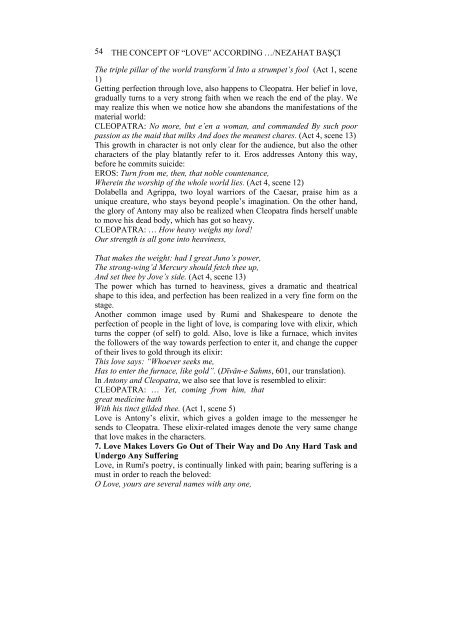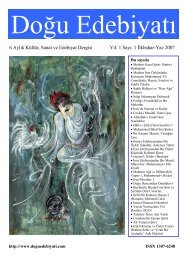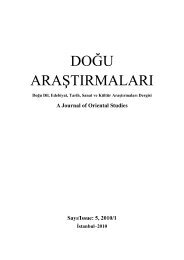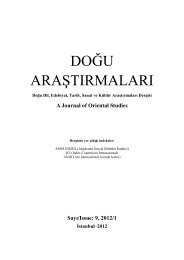A Journal of Oriental Studies Sayı/Issue - Doğu Edebiyatı
A Journal of Oriental Studies Sayı/Issue - Doğu Edebiyatı
A Journal of Oriental Studies Sayı/Issue - Doğu Edebiyatı
Create successful ePaper yourself
Turn your PDF publications into a flip-book with our unique Google optimized e-Paper software.
54<br />
THE CONCEPT OF “LOVE” ACCORDING …/NEZAHAT BAŞÇI<br />
The triple pillar <strong>of</strong> the world transform’d Into a strumpet’s fool (Act 1, scene<br />
1)<br />
Getting perfection through love, also happens to Cleopatra. Her belief in love,<br />
gradually turns to a very strong faith when we reach the end <strong>of</strong> the play. We<br />
may realize this when we notice how she abandons the manifestations <strong>of</strong> the<br />
material world:<br />
CLEOPATRA: No more, but e’en a woman, and commanded By such poor<br />
passion as the maid that milks And does the meanest chares. (Act 4, scene 13)<br />
This growth in character is not only clear for the audience, but also the other<br />
characters <strong>of</strong> the play blatantly refer to it. Eros addresses Antony this way,<br />
before he commits suicide:<br />
EROS: Turn from me, then, that noble countenance,<br />
Wherein the worship <strong>of</strong> the whole world lies. (Act 4, scene 12)<br />
Dolabella and Agrippa, two loyal warriors <strong>of</strong> the Caesar, praise him as a<br />
unique creature, who stays beyond people’s imagination. On the other hand,<br />
the glory <strong>of</strong> Antony may also be realized when Cleopatra finds herself unable<br />
to move his dead body, which has got so heavy.<br />
CLEOPATRA: … How heavy weighs my lord!<br />
Our strength is all gone into heaviness,<br />
That makes the weight: had I great Juno’s power,<br />
The strong-wing’d Mercury should fetch thee up,<br />
And set thee by Jove’s side. (Act 4, scene 13)<br />
The power which has turned to heaviness, gives a dramatic and theatrical<br />
shape to this idea, and perfection has been realized in a very fine form on the<br />
stage.<br />
Another common image used by Rumi and Shakespeare to denote the<br />
perfection <strong>of</strong> people in the light <strong>of</strong> love, is comparing love with elixir, which<br />
turns the copper (<strong>of</strong> self) to gold. Also, love is like a furnace, which invites<br />
the followers <strong>of</strong> the way towards perfection to enter it, and change the cupper<br />
<strong>of</strong> their lives to gold through its elixir:<br />
This love says: “Whoever seeks me,<br />
Has to enter the furnace, like gold”. (Dīvân-e Sahms, 601, our translation).<br />
In Antony and Cleopatra, we also see that love is resembled to elixir:<br />
CLEOPATRA: … Yet, coming from him, that<br />
great medicine hath<br />
With his tinct gilded thee. (Act 1, scene 5)<br />
Love is Antony’s elixir, which gives a golden image to the messenger he<br />
sends to Cleopatra. These elixir-related images denote the very same change<br />
that love makes in the characters.<br />
7. Love Makes Lovers Go Out <strong>of</strong> Their Way and Do Any Hard Task and<br />
Undergo Any Suffering<br />
Love, in Rumi's poetry, is continually linked with pain; bearing suffering is a<br />
must in order to reach the beloved:<br />
O Love, yours are several names with any one,





